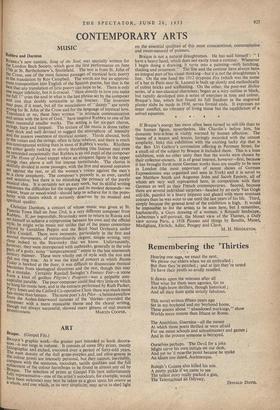CONTEMPORARY ARTS
MUSIC
Rubbra and Darnton ItunnuA's new cantata, Song of the Soul, was specially written for the London Bach Society, which gave the first performance on June 17th at St. Bartholomew's, Smithfield. The text is from St. John of the Cross, one of the most famous passages of mystical lyric poetry In the translation by Roy Campbell. The words are but an approxi- mate transposition into English of the Spanish poems, but that is the best that any translation of lyric poetry can hope to be. There is only one major infelicity, but it is crucial. "How daintily in love you make Me fall I" cries the soul in what is the last phrase set by the composer and one thus doubly noticeable to the listener. The inversion May pass, if it must, but all the associations of "dainty" are surely wrong for St. John of the Cross and for the language of mystical love. Translated or no, these lines written "in intimate communication and union with the love of God," have inspired Rubbra to one of his Most successful smaller works. The setting is for six-part chorus, strings, harp and timpani. The texture of the music is dense rather than thick and well devised to suggest the atmosphere of intensity and the austere sweetness of mystical ecstasy. Thirds abound, both In the voices and the strings, often in false relation, and there is much less contrapuntal writing than in most of Rubbra's works. Rhythms are either gently rocking or slowly throbbing (the listener may even be reminded occasionally that Rubbra is an old pupil of the composer of The Hymn of Jesus) except where an eloquent figure in the upper strings rises above a soft but intense tremolando. The chorus is skilfully divided in some passages, with the first and second sopranos et against the rest, or all the women's voices against the men's In a close antiphony. The composer's prosody is, as ever, careful and sensitive; but there is no mistaking the primacy of the purely Musical idea. It is certainly not an easy work, but its skilful writing minimises the difficulties for the singers and its modest demands—no .soloist, brass or wood-wind—should help to achieve for it the popu- larity with choirs which it certainly deserves by its musical and sPiritual quality.
_ Christian Darnton, a concert of whose music was given at St. Rublra. Town Hall on June 23rd, is a very different composer from ituhhra. lf, per impossibile, Stravinsky were to return to Russia and set himself to achieve a compromise between his own and the official style, he might write music not unlike that of the piano concertino played by Geraldine Peppin and the Boyd Neel Orchestra under Edric Cundell. There were moments, particularly in the first and second movements, of extraordinarily elegant, simple writing, very close indeed to the Stravinsky that we know. Unfortunately, however they were interspersed with outbreaks, generally in the solo Part, of a gusty, noisy "temperamental" music in the late nineteenth century manner. These were wholly out of style with the rest and did not ring true. As it was the kind of concert at which Russia Today is hawked at the door, it was difficult to disassociate fnusical blemishes from ideological directives and the rest, though this may be a mistake. Certainly Randall Swingler's Fantasy Fair—a scene from a kind ofgodless Pilgrim's Progress—was a palpable anti- capitalist parable. The poor composer could find Very little on which to hang his music here, and in the extracts performed by Ruth Packer, fair-music Jones and the Catford Co-operative Choir there was much more tam-music than fantasy. The same poet's Jet Pilot—a belated-swallow from_ the Auden-Isherwood summer of the 'thirties—provided the FMnPoser with a more musicable theme and the choral writing, Inventiveness. MARTIN Cl


































 Previous page
Previous page